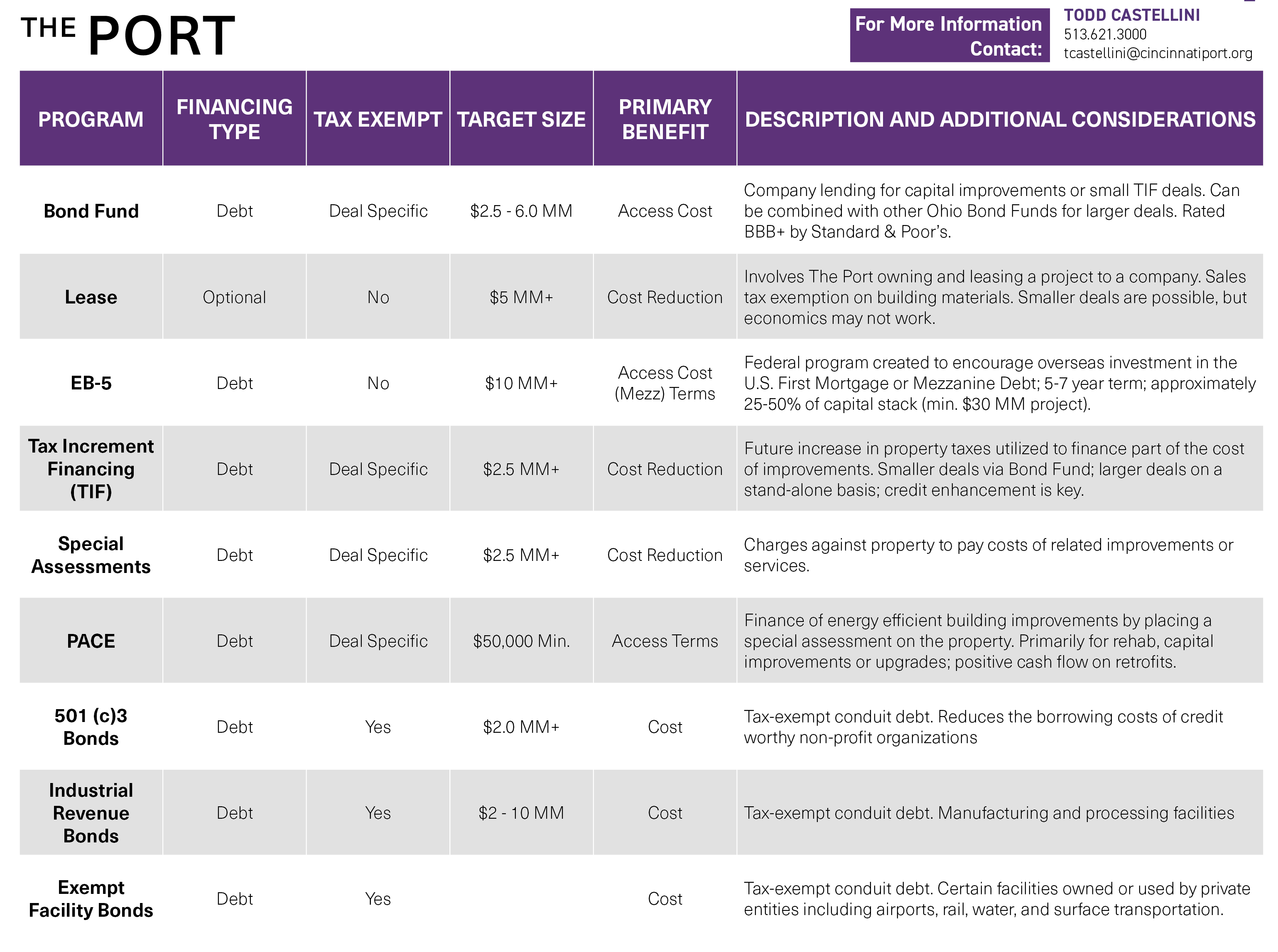Public Finance Practice
Offering unique development finance tools, loans for entrepreneurs, and down-payment assistance for homebuyers.
Development Finance for Economic Development and Job Creation
Our Public Finance Practice is rooted in commercial real estate and redevelopment of complex sites to stimulate private investment and job retention and creation. We offer unique tools such as the ability to issue tax-exempt debt, EB-5 financing, tax increment financing among others, and marshal additional state and local resources, including grants.
Bringing our Public Finance tools to a private sector investment can create a winning combination of lower interest rates, sales tax exemption savings, longer-term/fixed-rate options, and potential reinvestment of capital dollars back into the project and community.
Our approach to each project is tailored to meet the unique needs of each development opportunity.
The Impact
1,500+Anticipated Jobs Created
$1.14 Bin financing issued
$2.45 Btotal investment of financed projects
Public Finance Practice Programs
The Port is an issuer of bonds for the Southwest Ohio Regional Bond Fund, rated A- by Standard and Poor's, created in 2015 from the expansion of the Dayton-region Port Authority Bond Fund.
A bond fund is a credit-enhancement vehicle supported by a system of common program reserves and designed to achieve an investment-grade rating. This tool gives companies access to long-term, fixed rate financing to fund facility expansion, increase manufacturing capacity, and purchase new equipment.
A number of Ohio port authorities operate bond funds. Port authority bond funds achieve investment-grade ratings through a system of pooled reserves – they are also secured by a combination of individual company credits, guarantees, mortgages, and security agreements. Some are also secured by TIF or special assessment revenues.
Port lease financings have been used to convey a variety of incentives including:
- Sales tax exemption on building materials used in port authority owned buildings,
- Debt limitation advantages to the lessee/user, and
- Flexibility to the lessee/user in debt amortization and lease purchase options on financial development.
EB-5 Immigrant Investor Program (EB-5) is a federal program created to encourage overseas investment into approved projects to help drive job creation within the United States. Foreign nationals who make qualifying investments receive priority status for attaining lawful permanent U.S. residency for themselves and family members. Since the creation of EB-5 in 1990, it has emerged as an important source of project capital.
Tax Increment Financing (“TIF”) is a financing tool that allows the future increase in property taxes to be used to finance part of the cost of the improvement that will generate the increased taxes.
A TIF is put in place by an ordinance of the city council or township board of trustees and provides an exemption from property taxes that would be generated from the increased value of a development project. The exemption applies only to the increment. Existing property taxes continue to be paid to the respective government entities. The owner of the property is required to make “service payments in lieu of taxes” (commonly referred to as “PILOTs”) with respect to the exempted real property taxes. The PILOTs are then used to pay debt service on bonds issued.
In Ohio, school districts often receive all or a portion of the tax revenue which would have otherwise been received out of the PILOT payments. Some school districts have arrangements with their local city or township that govern all TIFs while others decide on a case-by-case basis.
TIF bonds may be issued on a taxable or tax-exempt basis. The bonds are non-recourse to the municipality and The Port, and do not count against the city’s general obligation bond cap unless the city specifically agrees to provide credit support.
TIF bonds are also frequently backed by some form of security in addition to the TIF proceeds. The form of this security varies depending on the structure of the deal, but it can take the form of a reserve fund, a minimum service payment agreement with the developer, a letter of credit provided by a bank and/or a special assessment. A special assessment is a charge levied upon a property especially benefited by a public improvement for the purpose of paying for part or all of the cost of the improvement. It is possible to finance infrastructure improvements using a special assessment without also using a TIF.
GC-PACE is an innovative program by which commercial and industrial building owners finance energy efficiency and renewable energy building improvements, by placing a special assessment on the property. GC-PACE financing works for a variety of upgrades and installations, such as solar panels, HVAC and boilers, insulation, geothermal projects, and energy efficiency improvements. It is increasingly being embraced by municipalities throughout the United States as an economic development program that encourages the modernization and “greening” of commercial buildings without involving government subsidy.
The Port can serve as a conduit revenue bond issuer for many different types of transactions. These bonds are based on the credit worthiness of the borrower and may be backed by a letter of credit. For example, port authorities have the ability to issue tax-exempt debt and can therefore issue tax-exempt conduit revenue bonds for 501(c)(3) non-profit organizations. Other forms of tax exempt bonds include low income housing, small issue manufacturing, and docks and wharves.



